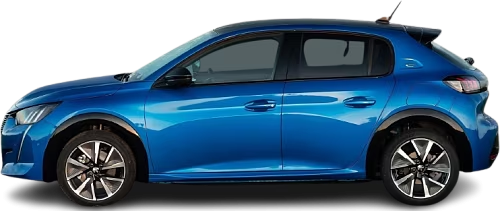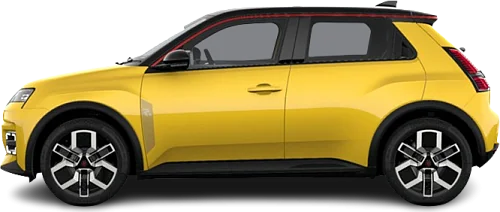Global EV Comparison: Peugeot e-208 50 kWh vs Renault 5 E-Tech EV40 120hp
Struggling to Decide? Let AI Help!
Your AI Summary Is Ready!
General Info
The Renault 5 E-Tech EV40 120hp (2024-...) is currently produced, it has a starting price of €27900. The Peugeot e-208 50 kWh (2021-2023) has been discontinued. You can find it for as low as €14990 on the used car market.
The two vehicles share the same body style: Hatchback.
| Property | Peugeot e-208 50 kWh | Renault 5 E-Tech EV40 120hp |
|---|---|---|
| Years of Production | 2021-2023 | 2024-… |
| Current Status | Discontinued | Produced |
| Country of Manufacture | Slovakia | France |
| Body Style | Hatchback | Hatchback |
| Market Availability | EU | EU |
| Price Europe (New) | - Price Europe (New) | €27900 |
| Price Europe (Used) | €14990 | - Price Europe (Used) |
| GCC Score | 5 | 5.2 |
Range and Efficiency
The Peugeot e-208 50 kWh (2021-2023) boasts a greater real-world range, a larger battery, and superior energy efficiency compared to the Renault 5 E-Tech EV40 120hp (2024-...).
| Property | Peugeot e-208 50 kWh | Renault 5 E-Tech EV40 120hp |
|---|---|---|
| Range (WLTP) | 362 km | 312 km |
| Range (GCC) | 311 km | 265 km |
| Battery Capacity (Nominal) | 50 kWh | 43 kWh |
| Battery Capacity (Usable) | 46.3 kWh | 40 kWh |
| Efficiency per 100 km | 14.9 kWh/100 km | 15.1 kWh/100 km |
| Efficiency per kWh | 6.72 km/kWh | 6.63 km/kWh |
| Range and Efficiency Score | 6.7 | 6.1 |
Charging
Both vehicles utilize a standard 400-volt architecture.
The Peugeot e-208 50 kWh (2021-2023) offers faster charging speeds at DC stations, reaching up to 101 kW, while the Renault 5 E-Tech EV40 120hp (2024-...) maxes out at 80 kW.
The Renault 5 E-Tech EV40 120hp (2024-...) features a more powerful on-board charger, supporting a maximum AC charging power of 11 kW, whereas the Peugeot e-208 50 kWh (2021-2023) is limited to 7.4 kW.
| Property | Peugeot e-208 50 kWh | Renault 5 E-Tech EV40 120hp |
|---|---|---|
| Max Charging Power (AC) | 7.4 kW | 11 kW |
| Max Charging Power (DC) | 101 kW | 80 kW |
| Architecture | 400 V | 400 V |
| Charge Port | CCS Type 2 | CCS Type 2 |
| Charging Score | 4.3 | 5.2 |
Performance
Both vehicles are front-wheel drive.
Both cars deliver the same 0-100 km/h acceleration time, but the Peugeot e-208 50 kWh (2021-2023) boasts greater motor power.
| Property | Peugeot e-208 50 kWh | Renault 5 E-Tech EV40 120hp |
|---|---|---|
| Drive Type | FWD | FWD |
| Motor Type | PMSM | EESM |
| Motor Power (kW) | 100 kW | 90 kW |
| Motor Power (hp) | 134 hp | 120 hp |
| Motor Torque | 260 Nm | 225 Nm |
| 0-100 km/h | 9 s | 9 s |
| Top Speed | 150 km/h | 150 km/h |
| Performance Score | 2.8 | 2.7 |
Dimensions
The Renault 5 E-Tech EV40 120hp (2024-...) is wider and taller, but the Peugeot e-208 50 kWh (2021-2023) is longer.
Both models have similar wheelbase lengths.
| Property | Peugeot e-208 50 kWh | Renault 5 E-Tech EV40 120hp |
|---|---|---|
| Length | 4055 mm | 3922 mm |
| Width (with Mirrors) | 1960 mm | 2020 mm |
| Width (w/o Mirrors) | 1765 mm | 1808 mm |
| Height | 1430 mm | 1498 mm |
| Wheelbase | 2540 mm | 2540 mm |
Cargo and Towing
The Renault 5 E-Tech EV40 120hp (2024-...) provides more trunk space, but both cars have an identical maximum cargo capacity with the rear seats folded.
Neither car is equipped with a frunk (front trunk).
The Renault 5 E-Tech EV40 120hp (2024-...) has a towing capacity of up to 500 kg, whereas the Peugeot e-208 50 kWh (2021-2023) is not officially rated for towing in the EU.
| Property | Peugeot e-208 50 kWh | Renault 5 E-Tech EV40 120hp |
|---|---|---|
| Number of Seats | 5 | 5 |
| Curb Weight | 1530 kg | 1400 kg |
| Cargo Volume (Trunk) | 265 l | 326 l |
| Cargo Volume (Max) | 1106 l | 1106 l |
| Cargo Volume (Frunk) | - Cargo Volume (Frunk) | - Cargo Volume (Frunk) |
| Towing Capacity | - Towing Capacity | 500 kg |
| Cargo and Towing Score | 3.5 | 4.2 |


